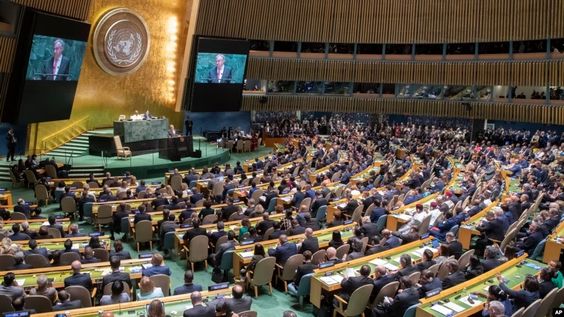Headlines
UN General Assembly set to vote on resolution urging a cease-fire between Israel and Hamas

Tuesday is scheduled as an extraordinary meeting of the U.N. General Assembly to discuss a draft resolution calling for an immediate humanitarian cease-fire in Gaza.
The resolution highlights the necessity of protecting Israeli and Palestinian civilians under international law and expresses “deep concern over the catastrophic humanitarian situation in the Gaza Strip and the suffering of the Palestinian civilian population.”
In addition to demanding the immediate release of all captives and the provision of humanitarian access, it exhorts all parties to adhere to international law.
A veto from the United States caused a similar resolution to fail in the U.N. Security Council last week. The General Assembly does not have veto power, and although its resolutions are not legally enforceable, they do have political significance.
As he briefed reporters on Monday, U.S. State Department spokesperson Matthew Miller outlined the country’s objection to the Security Council resolution.
“We have stated clearly that, although we are in favour of humanitarian breaks, we believe that a cease-fire would make it possible for the Hamas leadership, who planned and orchestrated the October 7 assaults, to remain in Gaza and continue to plot new attacks. It’s not acceptable, Miller declared.
Fighting in Gaza persisted ahead of Tuesday’s UN meeting, with Israeli airstrikes occurring in both the central and southern parts of the territory.
The Israeli military claimed that during a raid, ground forces discovered 250 missiles, mortar shells, and rocket-propelled grenades. The strikes were directed at rocket launch locations located throughout the Gaza Strip.
According to the Palestinian Health Ministry, four Palestinians were killed by Israeli forces in Jenin, a city located in the Israeli-occupied West Bank.
According to the Palestinian Red Crescent Society, an Israeli drone strike was the cause of the deaths.
Since the October 7 Hamas attack on Israel and the start of the Israeli offensive to destroy Hamas in the Gaza Strip, some 270 Palestinians have died in the West Bank.
On Tuesday, the World Health Organisation demanded that “medical care and humanitarian assistance in Gaza be protected.” It reported on challenges a World Health Organisation team faced when attempting to remove seriously injured patients and bring medical supplies to a hospital in Gaza City. It said that there were delays at military checkpoints and that Palestinian Red Crescent Society workers were being held.
World Health Organisation Director-General Tedros Adhanom Ghebreyesus declared, “The people of Gaza have the right to access health care.” “We need to safeguard the healthcare system. even during hostilities.
The Rafah sector in southern Gaza, close to the Egyptian border, is still receiving limited relief delivery, according to the U.N. humanitarian organisation, but other parts of Gaza are mostly cut off from receiving aid due to the fighting.
After visiting Gaza on Tuesday, Philippe Lazzarini, the director of the United Nations agency for Palestinian refugees, wrote on social media that the situation there is a “endless deepening tragedy.”
According to Lazzarini, “people are everywhere, live in the streets, and need everything.” They beg for protection and the cessation of this earthly agony. It is difficult to ask our coworkers to do the impossible in an impossible scenario.
Israel announced that it will open a second facility to filter aid before it is transported into Gaza, enabling screening to occur at the border crossing at Kerem Shalom. The Rafah crossing will remain be the entry point for all help into Gaza; according to the U.N., the daily influx of relief vehicles there has significantly decreased from pre-war levels.
According to Israeli Defence Minister Yoav Gallant, Israel has no plans to settle down in Gaza long-term.
“Israel has no plans to settle down in the Gaza Strip permanently, but we will do all it takes to eliminate Hamas. Along the Gaza border is where we exclusively worry about our security and the security of our people,” Gallant told reporters.
He stated that Israeli military action could go on for months at a time and refused to provide a timeline for the end of the conflict.
In the previous seven weeks, the Israeli air and ground offensive has claimed the lives of approximately 18,000 people, the majority of them women and children, according to the health ministry operated by Hamas.
On October 7, Hamas militants entered southern Israel, prompting Israel to launch a military operation to eradicate the organisation. Israel reported that the terror strike claimed the lives of 1,200 people and captured about 240 more.
An estimated 1.9 million people have been forced from their homes in Gaza due to the fighting, with many of them taking refuge in packed facilities in the south despite warnings of unhygienic conditions and the possibility of a rise in infectious diseases.
This report was produced in collaboration with State Department Bureau Chief Nike Ching and United Nations journalist Margaret Besheer. This report included information from Reuters, Agence France-Presse, and The Associated Press.
